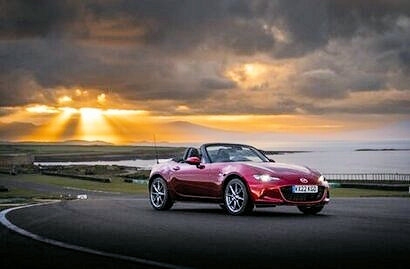
The unmodified Mazda MX-5 completed laps at Anglesey Circuit in Wales, Oulton Park in England, Knockhill in Scotland and Kirkistown in Northern Ireland across a week in which the car also drove 1000-miles around the UK from circuit to circuit on sustainable petrol.
The second generation Coryton fuel was created using 100 percent agricultural waste, such as straw, by-products and waste from crops which wouldn’t be used for consumption. Highlighting the role sustainable fuels can play in de-carbonising both road cars and motorsport, the drive also highlights how sustainable fuels could complement Mazda’s Multi-Solution approach to achieving climate neutrality.
Mazda is committed to reducing CO2 emissions from every car and believes that all options available must be used to achieve climate neutrality.
The company’s Skyactiv EV scalable architecture will be able to build electric vehicles of various sizes and body types on the same production line. Additionally, the company is involved in developing unique and efficient combustion technology while also investing in different projects and partnerships to promote the development and use of renewable fuels in cars. In Japan, Mazda is involved in several joint research projects and studies as part of an ongoing industry-academia-government collaboration to promote the wide-spread adoption of biofuels from microalgae growth. In Europe, Mazda was the first OEM to join the eFuel Alliance.
The 1000-mile drive across the UK and the establishment of the circuit laps, is aimed at showing that sustainable fossil-free fuels can also be a solution for decarbonising the many millions of combustion engine cars that will remain on our roads for decades to come.
The Mazda MX-5 drove from Coryton HQ in Essex, via Motorsport UK HQ in Bicester, before completing the tour of the four UK circuits. The completely unmodified MX-5’s performance, economy and engine character was unchanged by the SUSTAIN 100 percent road fuel supplied by Coryton, in fact excluding the circuit laps the MX-5 averaged 45.6mpg.
“We're delighted to have worked with Mazda UK on this project, which combined a great car with sustainable fuel to lower more than just lap times” said David Richardson, director at Coryton. “As this challenge has shown, sustainable fuel is a real and credible player in our efforts towards net zero. It's a solution that performs incredibly well, works with our existing vehicles and has the potential to significantly reduce the amount of CO2 we currently release compared to traditional fossil fuels. Drop-in sustainable fuels are ready now for everyday road cars with internal combustion engines. The UK alone currently has 36 million combustion engine cars on the roads that we could be reducing the emissions from right now. The product and technology is ready to go – the industry just needs support to help scale up operations, which can be done gradually. But every litre of fossil fuel we replace directly helps us get closer towards our climate targets. Working with forward thinking partners like Mazda, we'll continue to show just how easy and impactful the integration of sustainable fuel could be whilst operations scale up for other technologies such as electric. There are a number of solutions, which can all work together to help us meet our goals, it doesn’t need to be all or nothing.”
While the potential of widespread adoption of sustainable fuel for road cars is clear, its use in motorsport and the part it can play in the future sustainability of motorsport from international to club level is already underway. Mazda worked with Motorsport UK to recognise and support the completion of laps on a circuit in each of the UK nations.
“Around 90 percent of vehicles on UK roads are still powered purely by an internal combustion engine, with many capable of running for many years to come” added Hugh Chambers, Motorsport UK Chief Executive Officer. “Sustainable fuels, such as biofuels, efuels and synthetic fuels provide a low-carbon alternative to conventional hydrocarbon fuels, ensuring the lifespan of these vehicles is maximised with minimum impact. It’s fantastic to see Coryton Fuels join forces with Mazda to demonstrate that it’s possible for everyday road cars to not only be driven on a motorsport circuit powered by 100 percent sustainable fuels, but do so with no loss of performance or reliability.”
Another example of Mazda’s promotion of advanced second-generation bio-fuels via motorsport is the Mazda2 that competes in the Super Taikyu Endurance Series in Japan. Entered in the ST-Q class that’s exclusively for experimental or alternatively fuelled cars, the Mazda2 is powered by a 100 per cent biodiesel made from used cooking oil and microalgae fats. Partnered with Japanese company Euglena, whose aim is to produce biodiesel commercially by 2025, their next-generation biodiesel is created using biomass such as plants and microalgae. As they absorb CO2 when growing, the total amount of CO2 in the atmosphere is neutral when you drive with this fuel. For the 2023 season however, Mazda is developing a new race car based on the Mazda3 that has a more powerful engine but will continue to be powered by the same biodiesel.
For additional information:

